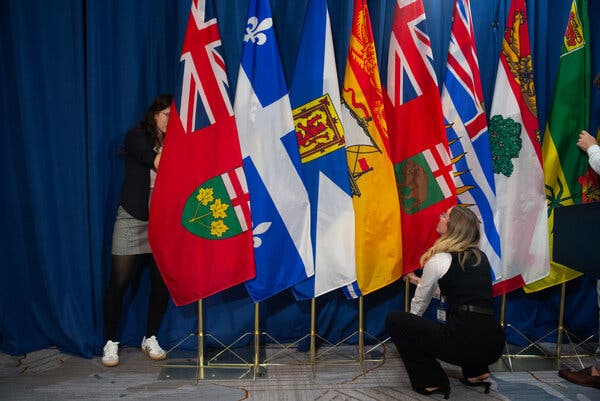The leaders of Canada’s provinces and territories united against U.S. President Donald Trump’s proposed tariffs during a three-day meeting, yet diverged on how to address the economic fallout. While the premiers expressed collective disapproval of Trump’s threats to impose 35 percent tariffs on Canadian exports, their strategies for retaliation revealed longstanding regional divides.
During discussions with Prime Minister Mark Carney, the 13 premiers acknowledged the potential impact of the tariffs, slated to take effect on August 1. Despite the shared condemnation of U.S. trade policies, their approaches to counter the anticipated economic turmoil varied significantly.
The meeting, which aimed to formulate a cohesive response, highlighted contrasting opinions on how Canada should navigate the impending trade war. Provinces expressed differing views on whether to escalate trade retaliation against the United States. While some leaders advocated for a more aggressive stance, others preferred to seek diplomatic solutions.
Although no specific projects were announced, discussions about infrastructure investments emerged as a potential avenue to mitigate losses from reduced trade. Carney’s proposal to rapidly build major infrastructure projects, including oil pipelines, aimed to offset economic challenges. However, this suggestion prompted further debate among the premiers, revealing the complexities of aligning regional interests with national goals.
As the meeting concluded on Wednesday, Doug Ford, premier of Ontario and host of the gathering, emphasized the importance of a unified Canadian front. He referred to the premiers’ collective stance against Trump’s tariffs as part of a “united team Canada approach.” Ford reiterated the necessity of retaliatory measures should Trump proceed with the tariffs or if an agreement is not reached before the deadline.
This meeting underscores the delicate balance Canada must strike between presenting a united front against external pressures and addressing the distinct needs of its provinces. The ongoing economic uncertainty, exacerbated by the potential for increased tariffs, continues to challenge Canada’s unity in trade matters.
In a time of heightened tension between Canada and the United States, the premiers’ responses to Trump’s proposed tariffs will play a crucial role in shaping the future of trade relations and economic stability in the region. As discussions progress, the challenge remains to transform a shared condemnation into a coherent, actionable strategy that accommodates the diverse perspectives of Canada’s provinces.








































































